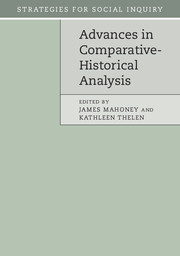Book contents
- Frontmatter
- Contents
- List of figures
- List of tables
- List of contributors
- Preface
- Part I Introduction
- Part II Agenda-setting work
- 2 The developmental state is dead: long live the developmental state!
- 3 Coalitions, policies, and distribution: Esping-Andersen's Three Worlds of Welfare Capitalism
- 4 Not just what, but when (and how): comparative-historical approaches to authoritarian durability
- Part III Tools for temporal analysis
- Part IV Issues of method
- Epilogue: comparative-historical analysis: past, present, future
- Index
- References
4 - Not just what, but when (and how): comparative-historical approaches to authoritarian durability
from Part II - Agenda-setting work
Published online by Cambridge University Press: 05 July 2015
- Frontmatter
- Contents
- List of figures
- List of tables
- List of contributors
- Preface
- Part I Introduction
- Part II Agenda-setting work
- 2 The developmental state is dead: long live the developmental state!
- 3 Coalitions, policies, and distribution: Esping-Andersen's Three Worlds of Welfare Capitalism
- 4 Not just what, but when (and how): comparative-historical approaches to authoritarian durability
- Part III Tools for temporal analysis
- Part IV Issues of method
- Epilogue: comparative-historical analysis: past, present, future
- Index
- References
Summary
After a nearly two-decade span in which regime studies focused almost exclusively on democratization, scholarly attention turned back to authoritarianism in the early 2000s. Faced with the persistence of authoritarian rule in the Middle East, China, and elsewhere, as well as its (re)emergence in Russia and other former Soviet states, scholars began to investigate the sources of durable authoritarianism.
Recent research has drawn attention to a range of factors that contribute to authoritarian stability, including natural resource rents, economic performance, and political institutions such as parties, elections, and legislatures. Most of these analyses are based on “constant cause” explanations, in which key causal factors (1) must be present for the predicted outcome to be observed and (2) are treated as having universal, rather than context-dependent, effects. This work has generated important insights. However, an emerging body of research suggests that the effects of standard economic and institutional variables are mediated by historical and contextual factors, such as when (relative to the onset of other variables) and how authoritarian regimes emerge or consolidate. This growing scholarly attention to timing and context – seen in the recent “historical turn” in regime studies (Capoccia and Ziblatt 2010) – highlights the continued vitality of comparative-historical analysis. Indeed, as we show below, recent comparative-historical research offers powerful tools for understanding the roots of authoritarian durability.
This chapter examines the contributions of comparative-historical analysis to recent research on authoritarianism, highlighting what is gained by paying close attention to regime origins, timing, and sequencing. These factors, we argue, help explain why regimes with similar institutional arrangements vary so widely in their durability and why autocracies respond in diverging ways to similar economic or natural resource “shocks.” The chapter then turns to a major challenge facing comparative-historical scholarship: the question of how, and for how long, founding legacies are reproduced. We argue that founding legacies are rarely static, or self-perpetuating, as is sometimes assumed. Rather, many of them are bounded, in that their effects weaken and disappear over time, even in the absence of exogenous change.
- Type
- Chapter
- Information
- Advances in Comparative-Historical Analysis , pp. 97 - 120Publisher: Cambridge University PressPrint publication year: 2015
References
- 13
- Cited by

